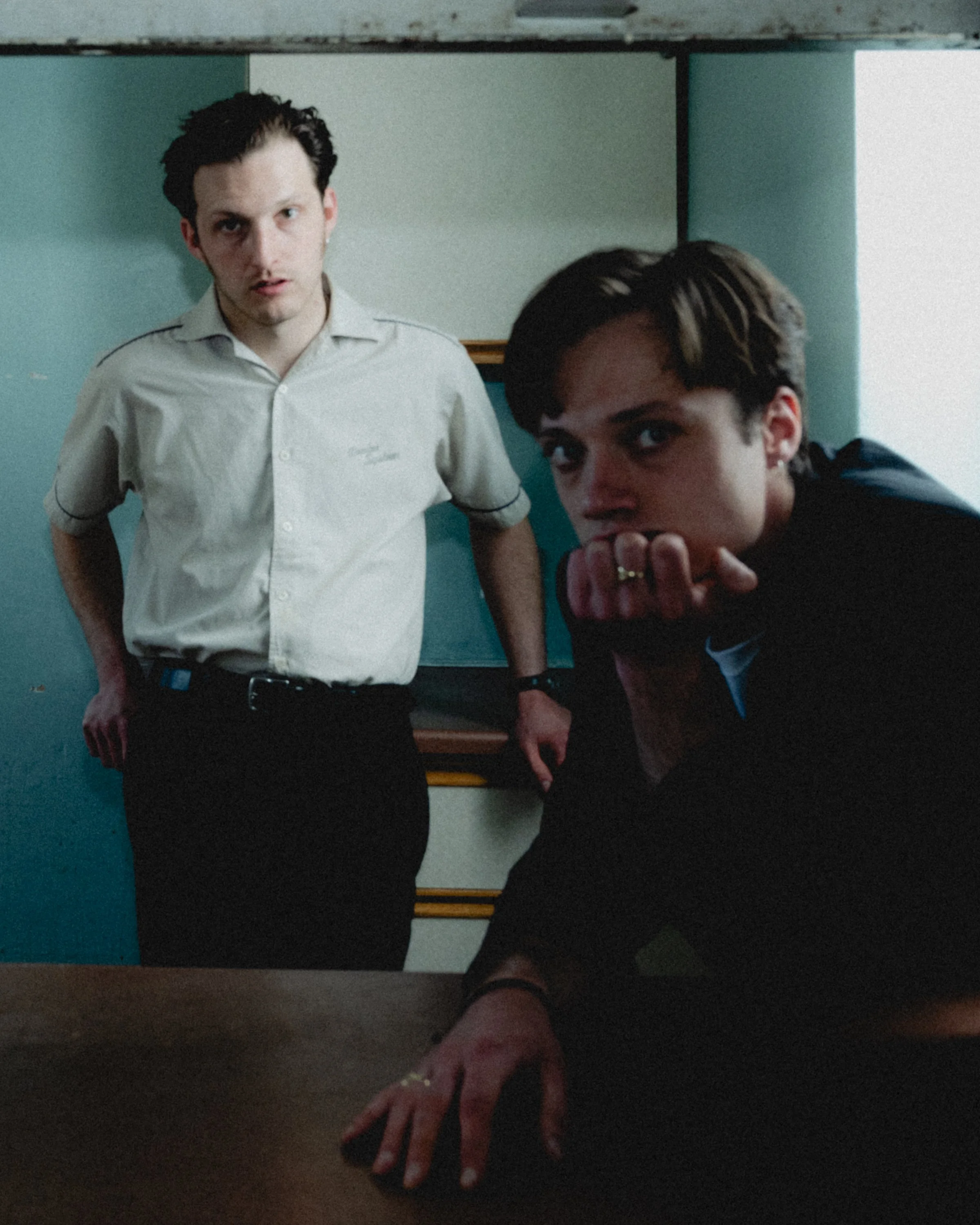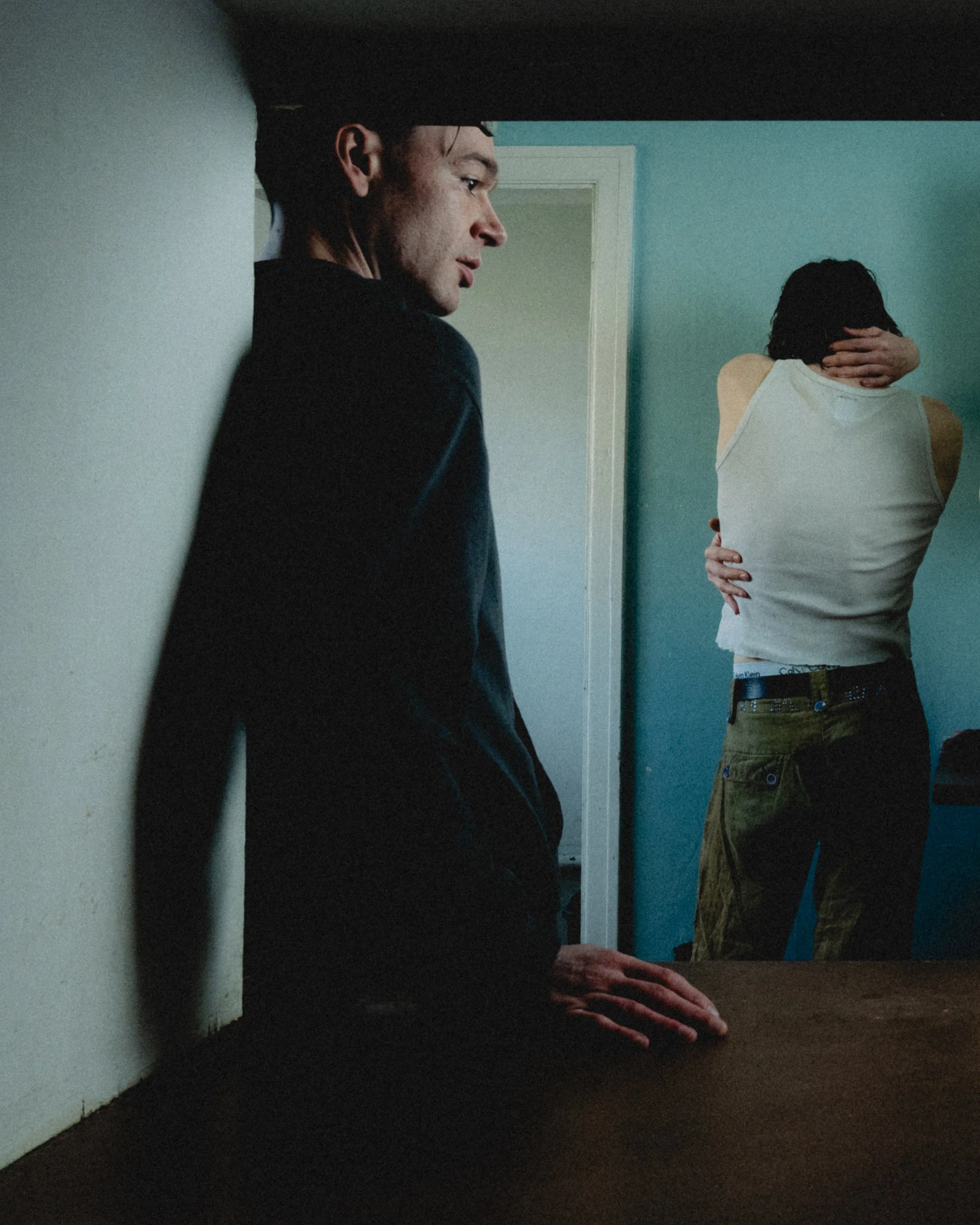Start Listening To: Legss
The London-Liverpool four-piece talk debut albums, Mark Fisher, and making sense of a world that no longer does.
For a band with a reputation for intensity, Legss approach their work with a quiet kind of precision. On Unreal, their long-awaited debut album, the London- and Liverpool-based four-piece stitch together dislocation, theatricality and bleak humour into something vivid and deeply unnerving. Across nine tracks, they explore miscommunication, social decay, and personal drift with a sense of conceptual rigour that’s rare in British guitar music right now. In this conversation, the band reflect on producing the album themselves, drawing inspiration from hangovers and Alain Resnais, and why dusk is worse than dawn.
For those unfamiliar with your music, can you tell us who you are, where you’re from and about the music you make?
We’re Legss, a four-piece boy band from London and Liverpool, and we make unnerving, dark guitar anthems for the cultural sink.
You’ve described Unreal as “the work of a lifetime.” What made this album feel like such a defining statement for you?
Lifetime was probably a bit of an overstatement hahah. But in terms of the band’s lifetime, we’ve been going for so long, so to only now be releasing our debut album feels like everything we’ve done to evolve our sound and grow together has led us to making this record. It sounds like an obvious thing for any band releasing their debut to say. But to have started in 2019, released three EPs, and still be closer than ever and writing our best music feels special to us.
Can you tell us more about how the album was produced?
The album was co-produced by Balázs Altsach and our very own Louis Grace, and we all just worked very closely together. Balázs is definitely the fifth member. He’s been with us since our last EP Fester, and he was instrumental in creating the environment for the album to be recorded in. He came with us to the Isle of Wight to record it, produced it there, made sure we were being true to the songs, and mixed the entire album. He’s just been there at every step.
Louis, you co-produced the record. How did that shape the internal dynamic of the band while making Unreal? Were there moments where wearing both hats got complicated?
It’s kind of like tying the laces of all the boy’s shoes before we leave for college. Regarding two hats, I think these days the production and song writing often blur together, so for me it feels very much like one hat, and fulfilling in a way that just making a beat or writing a melody isn’t. It’s kind of like dressing a salad. But I really appreciate the space everyone gives me to exercise my interest in production and it’s not like I’m ever alone with it. Balazs has been their every step and the band have brilliant ideas. We’ve all worked closely whilst figuring out what the vibe is. Ultimately, keeping that sound in-house from an early stage in the recording process, gives it a very honest outcome, which we’re all very proud of.
The idea of unreality and miscommunication runs through the album. What drew you to that theme, and how did you want to reflect it sonically?
We were drawn to it through observing our daily lives and habits, and how we interact with other people, and then reflecting on this. It feels bizarre and unreal that the way we live our normal lives is so unnatural now. We also just feel it’s important for a body of work, whatever form, to have a central theme or conceptual reasoning behind it. We’ve always felt compelled, however pretentious it’s sounded, to have our music reflect a wider feeling or sensation. And obviously you follow a lot of tropes doing that, which have been tackled by generations before you, but right now, to us, the breakdown of communication feels like the most urgent thing we could be writing about.
Tracks like ‘Bit Rot’ and ‘Fugue’ feel loaded even in name. Do you tend to start with a title and write toward it, or do those things arrive later in the process?
I don’t think we’ve ever started with a title, if anything I’d say titles always come last. Fugue was actually the last track to be named, like only a few days before we had to send everything off, but it just fit that track so perfectly: its dual-definition of a dissociative state and a single revolving melody.
There’s always been a theatrical quality to your music. How do you balance that sense of performance with personal vulnerability?
Well, performance is the best foil for vulnerability, and so I think we’ve balanced it by leaning into it. By making the vulnerable, quiet moments as dark and delicate as we could, and the more theatrical moments bigger and barer, it sort of brings them closer together, or helps contextualise the other.
You’ve mentioned world-building. If Unreal is a world, what does it look like? Who lives there?
Unreal is actually a very real place. It’s less the construction of a new world but a view of the world we live in, one that stutters and struggles for meaning/fulfilment.
The afterword of Mark Fisher’s Ghosts of My Life namechecks Legss. How did it feel being brought into that lineage, and has Fisher’s writing influenced your approach to art and culture?
Honestly fucking mad. He means a lot to all of us, and the previous answer is sort of just a very watered-down version of his slow cancellation of the future. We studied at Goldsmiths during his time there, and his approach to understanding the production of music and art in late capitalism is something that has been present in our writing since the start.
‘Sleepers, Awake’ is a phrase loaded with literary and religious baggage. How did that track come together, and why that title?
Musically, the track was very much jammed into existence. Max had this winding, dark guitar riff that became the structure for the verses, and then we wanted to write something that sort of propelled out of it. The lyrics came from a longer poem about being hungover and tired of keeping up appearances, and the title just seemed to fit that. I also like flipping the meaning of an existing, grander sentiment into something small and banal. I doubt Bach would be proud.
You’ve always had a flair for lyrics that are bleak, funny, and absurd all at once. What advice would you give for writing lyrics?
To try and write to a subject.
What do you love right now?
Dawn
What do you hate right now?
Dusk
Name an album you’re still listening to from when you were younger and why it’s still important to you?
Primary Colours by The Horrors, because patience is a virtue.
What do you hope listeners take away from your music after hearing it for the first time?
That they want to listen to it again? Surely that’s what everyone wants.
The final track is titled ‘Fugue’ — a word that can mean everything from psychological dislocation to a Baroque composition style. What does it mean in this context, and why end there?
It allows for a moment of reflection. In Bach’s Goldberg Variations, he starts and ends on the same aria, the same piece of music. But through the unreal journey the pianist and the listener have been on in the intervening 30 variations on the theme, the same aria played at the end is so utterly changed, it creates a space for familiarity and contemplation. My grandma said that after any meal at the dinner table, my grandad, regardless of if others were still eating, would lean back in his chair and smoke two Players No 6 cigarettes in a row, filling their box kitchen with smoke. Fugue at the end of the album, especially after 909, offers that same feeling of well-fed deliverance.
Photography By: Jacob Ray


